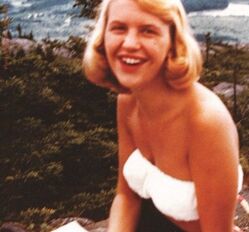|
"Wintering" is Sylvia Plath's triumphant declaration of victory and joy. Victory at having found the world of honesty and truth that she sought her entire life, first as a scientist following in her father's footsteps, then as a poet, searching beyond the gates of self-identity and death for the reality she intuited might exist beneath the world's often superficial surface. Joy is what she found under that surface. The poem is part of her "Bee Sequence" and I suggest you read the whole set of poems sometime. For now, we'll concentrate on just "Wintering," (click picture above) which is the final poem of the sequence. The poem starts with the line: This is the easy time, there is nothing doing. What? I thought this was a Plath poem? How could the writer of "Daddy" and "Lady Lazarus" start a poem this way? Didn't she kill herself? What's going on here? The truth is, Plath found immense joy, creative peace, and unstoppable inspiration in her experiences with the loss of personal identity. It is similar, but not exactly the same as, what reportedly happens to some people who take psychedelic drugs. Plath didn't use psychedelics, but the breakdown of her "ego" and her ties to the world of "mendacity" even for a short period, through her encounters with poetry and nature, revealed an illumination that not only made her poetic name, but changed the entire world, and is still growing. In "Wintering" she enters the cellar of an unnamed aristocrat in a spare house she has rented. This is a symbol of the abyss, the "blackness and silence" of the Yew tree, the All Being of nature. Only now Plath has no fear of the void, she has made a home for herself there. But it is not based on materialistic things or titles such as "Sir So-and So's gin." Instead it is based on an abiding -- perhaps eternal -- connection with the rhythms of nature. She has become Queen of the Bees, just as her father, Otto, was known as King of the Bees, but as Queen she doesn't want to control nature, she simply wants to perpetuate it. She has learned from her encounters with nature to see life, not death, as the impetus of being. She has regained a personal identity, but it is a greater, much wiser and more enduring self-identity than she had as "Ted Hughes's wife." This is how we should remember Plath, because this is the poet she truly was... Her tragic suicide was the result of her inability to stay in this moment of illumination, but she touched it and she left a record to inspire countless generations to come. So in a sense, she did stay rooted in it. This concludes my first blog-post series on Sylvia Plath, but it won't be my last! If you enjoyed the posts, please consider making a small donation to my PayPal, or use the Buy Me A Coffee button to make a donation through my MusicGuru page. I could really use the support right now!! https://www.buymeacoffee.com/writerdanQ Donate via: PayPal: [email protected] CashApp: $writerdan Categories All
0 Comments
Leave a Reply. |

